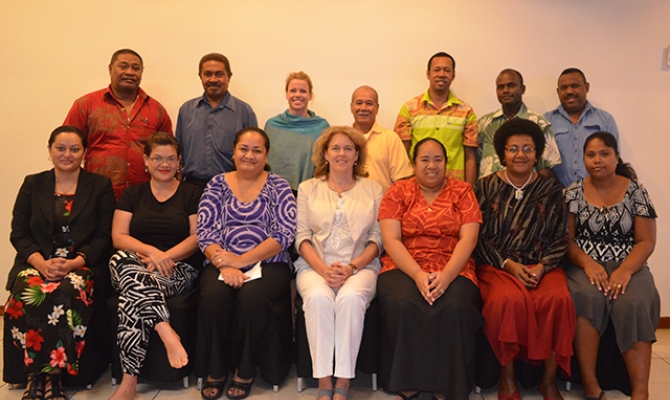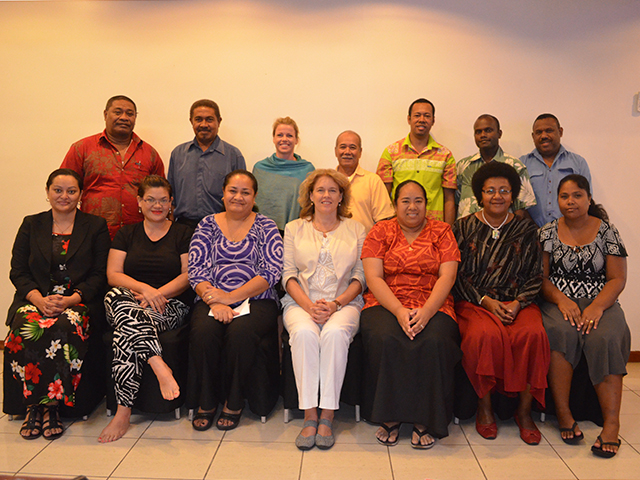
Climate Change Resilience
SPREP's groundbreaking draft report on current and projected greenhouse gas emission reductions in the Pacific region has been commended by a gathering of renewable energy experts in Nadi.
The draft report was reviewed and discussed by participants at the final Multipartite Review (MPR) for the Pacific Islands Greenhouse Gas Abatement through Renewable Energy Project (PIGGAREP). The meeting, which wrapped up late last week, brought together representatives from Secretariat of the Pacific Community (SPC), International Union for Conservation of Nature (IUCN), European Union, United Nations Development Programme (UNDP) and SPREP with PIGGAREP Coordinators from eight different Pacific island countries and territories.
The release and critical discussion of the draft report was one of the highlights of the two and a half day programme which was designed to review the overall project status of PIGGAREP and to share success stories and lessons learnt during the implementation of the six and a half year project.

The report details current and projected emission reductions capturing results and impacts of PIGGAREP activities. Preliminary results have indicated that by 2019, an estimated 551,881 tons of carbon will have been avoided as a result of efforts to reduce the use of and reliance on fossil fuels in the Pacific region.
While the projected reduction has not met the anticipated target set at the inception of the PIGGAREP project in 2007, Dr Netatua Pelesikoti, Director of the Climate Change Division at SPREP explains that the results are nonetheless impressive:
"Saving the planet from an estimated 500,000 tons of carbon by the year 2019 can only be considered a big success. This outcome helps to mitigate against climate change as well as sending a clear message to the international community that our region means business when it comes to greenhouse gas emission reduction."
Speaking at the meeting in Nadi, Ms Lizbeth Cullity, Resident Representative of the United Nations Development Programme (UNDP), Samoa Multi Country Office was also enthusiastic about the results:
"I want to congratulate the PIGGAREP Coordinators and all those who have been involved in the activities relating to renewable energy and energy efficient installations across the Pacific. Not only will these activities reduce the emissions of CO2, but more importantly, they will reduce small islands developing states' dependency on fossil fuels, and the relating high costs of fossil fuel based power generation."
Ms Sili'a Kilepoa-Ualesi, SPREP's Project Manager for PIGGAREP, explains that emission reductions are being achieved through a variety of different activities in technical capacity building, market development, institutional strengthening, financial support and more:
"It's important to point out that these results are not being brought about via a handful of major projects. Instead they're being realised through a number of small activities over 14 countries, each of which contribute to the region-wide reduction in carbon emissions. It's a perfect example of how from little things, big things can grow."
While the draft Greenhouse Gas Emissions Report is still under review, SPREP plans to release the finalised report at the completion of the project.
PIGGAREP is a Global Environment Facility (GEF) funded regional project being implemented by UNDP (through the UNDP Samoa Multi Country Office) with SPREP as the implementing partner. Two extension projects, known as PIGGAREP+, are supported through the SIDS DOCK Support Program, a joint initiative of the UNDP and the World Bank, developed in close consultation with the Alliance of Small Island States and funded by the Government of Denmark.
For more information, please contact Ms Sili'a Kilepoa-Ualesi at SPREP.
The draft report was reviewed and discussed by participants at the final Multipartite Review (MPR) for the Pacific Islands Greenhouse Gas Abatement through Renewable Energy Project (PIGGAREP). The meeting, which wrapped up late last week, brought together representatives from Secretariat of the Pacific Community (SPC), International Union for Conservation of Nature (IUCN), European Union, United Nations Development Programme (UNDP) and SPREP with PIGGAREP Coordinators from eight different Pacific island countries and territories.
The release and critical discussion of the draft report was one of the highlights of the two and a half day programme which was designed to review the overall project status of PIGGAREP and to share success stories and lessons learnt during the implementation of the six and a half year project.

Pictured above: Participants at the final Multipartite Review (MPR) for the Pacific Islands Greenhouse Gas Abatement through Renewable Energy Project (PIGGAREP) in Nadi, Fiji.
The report details current and projected emission reductions capturing results and impacts of PIGGAREP activities. Preliminary results have indicated that by 2019, an estimated 551,881 tons of carbon will have been avoided as a result of efforts to reduce the use of and reliance on fossil fuels in the Pacific region.
While the projected reduction has not met the anticipated target set at the inception of the PIGGAREP project in 2007, Dr Netatua Pelesikoti, Director of the Climate Change Division at SPREP explains that the results are nonetheless impressive:
"Saving the planet from an estimated 500,000 tons of carbon by the year 2019 can only be considered a big success. This outcome helps to mitigate against climate change as well as sending a clear message to the international community that our region means business when it comes to greenhouse gas emission reduction."
Speaking at the meeting in Nadi, Ms Lizbeth Cullity, Resident Representative of the United Nations Development Programme (UNDP), Samoa Multi Country Office was also enthusiastic about the results:
"I want to congratulate the PIGGAREP Coordinators and all those who have been involved in the activities relating to renewable energy and energy efficient installations across the Pacific. Not only will these activities reduce the emissions of CO2, but more importantly, they will reduce small islands developing states' dependency on fossil fuels, and the relating high costs of fossil fuel based power generation."
Ms Sili'a Kilepoa-Ualesi, SPREP's Project Manager for PIGGAREP, explains that emission reductions are being achieved through a variety of different activities in technical capacity building, market development, institutional strengthening, financial support and more:
"It's important to point out that these results are not being brought about via a handful of major projects. Instead they're being realised through a number of small activities over 14 countries, each of which contribute to the region-wide reduction in carbon emissions. It's a perfect example of how from little things, big things can grow."
While the draft Greenhouse Gas Emissions Report is still under review, SPREP plans to release the finalised report at the completion of the project.
PIGGAREP is a Global Environment Facility (GEF) funded regional project being implemented by UNDP (through the UNDP Samoa Multi Country Office) with SPREP as the implementing partner. Two extension projects, known as PIGGAREP+, are supported through the SIDS DOCK Support Program, a joint initiative of the UNDP and the World Bank, developed in close consultation with the Alliance of Small Island States and funded by the Government of Denmark.
For more information, please contact Ms Sili'a Kilepoa-Ualesi at SPREP.